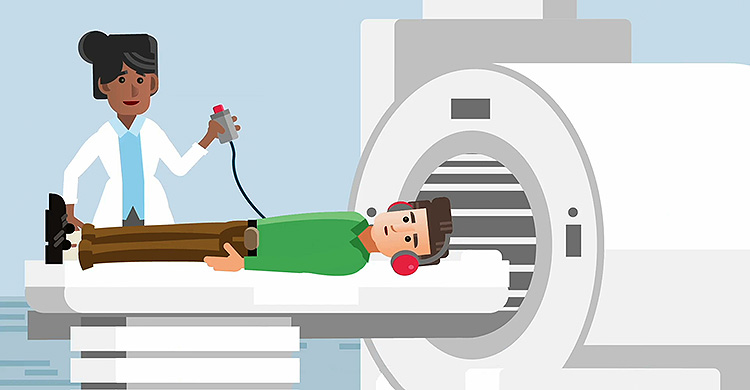Dealing with a Bowel Cancer Diagnosis

When Maria Claudia Renjifo Zambrano from Colombia was diagnosed with very advanced-stage bowel cancer, she was told she didn’t even have a 50/50 chance of surviving. But she was determined to fight – and found a way that helped her along the way.
Maria Claudia Renjifo Zambrano had been feeling unwell for quite some time. She was in her early forties and had just moved from Venezuela to Pittsburgh in the United States. Until this point, she had always thought circumstances in the country were to blame for her condition. She was living in Venezuela for work. “Venezuela was in a very difficult situation both politically and socially,” explains Maria. This was a great source of stress for her. Furthermore, she found it difficult to maintain a healthy diet.
She thought moving to the United States would change all this for the better. Now she was safe, eating healthily and training for a five-kilometer run – but even after a month, the symptoms still persisted. “I was constantly tired. My stomach was bloated, and I was suffering from wind.” Shortly after, she found blood in her stool, so she consulted a doctor. That’s when things began to snowball. She underwent one examination after another and was eventually diagnosed with an aggressive form of bowel cancer that had reached a highly advanced stage.
Cancer. “That happens to other people, but not to me. I’m strong.” That’s the first thing that went through Maria’s head. “I was only 43 years old. People don’t get bowel cancer at that age.” She was young and suddenly at a 60-percent risk of dying from cancer, with just a 40-percent chance of surviving. “I was terrified.”

Bowel cancer – the fourth most common form of cancer
The term bowel cancer is used to describe any malignant tumors found in the bowel. Malignant cancer cells most commonly occur in the tissue of the colon or rectum, which is why it is often also referred to as colorectal cancer (CRC). CRC is the fourth most common form of cancer worldwide, with over one million new diagnoses every year.
The mortality rate for the disease is approximately 50 percent. On average, 55 percent of patients are still alive five years after being diagnosed. This rate is heavily dependent on how advanced the tumor is upon discovery – ranging from 74 percent for patients with stage-1 cancer to just 6 percent for those in stage 4.
For the first few weeks after her diagnosis, she couldn’t stop thinking about the 60-percent mortality rate and that it was more likely that she wouldn’t make it. Shortly before beginning chemotherapy, Maria made a decision: “I chose, from that point on, to focus on the 40 percent – on the likelihood that I would get through this!”
In hindsight, she says: “I think that made a real difference to how I dealt with the process, the side effects and the risks.” After having a section of her colon surgically removed and undergoing six months of chemotherapy, she decided to participate in a study. The tablets she received in the study were taken after her chemotherapy was completed.
“The risk of cancer recurring is at its highest in the first two years. Therefore, being on a study where the goal of the investigation is to prevent the cancer to come meant a big hope for me. I knew it was something that could potentially stop the cancer from coming back, and that feeling was priceless,” the 43-year-old remembers. This wasn’t the case for other patients she met. “Most bowel cancer patients are thrown straight back into their lives after chemotherapy. They have to live with the risk and fear of their cancer coming back.”
But even with this added sense of security, Maria’s outlook on life still changed, and she stopped making long-term plans. “On a subconscious level, all I could concentrate on was the next three months. I had no idea whether I would make it another year or not. As sad as it sounds, it helped me focus on the beauty of the here and now, the amazing people around me and the good things that happen to me on a daily basis. I learned not to let the cancer control my life and to ask for help and accept it. My faith grew stronger.”
- 1/5
- 2/5
- 3/5
- 4/5
- 5/5





The cancer also changed her lifestyle. “I don’t eat red meat or processed foods anymore and rarely drink alcohol – and if I do drink, it’s in moderation. I also do a lot more exercise and have become a big fan of Pilates.”
Following her diagnosis, Maria’s relatives decided to go for colonoscopies, too. It was discovered that three of her maternal aunts had colorectal polyps, which can lead to cancer. Another of her aunts was diagnosed with stage-1 bowel cancer and had to undergo surgery.
In light of her own personal experience, Maria advises everyone to take the necessary precautions. “Bowel cancer doesn’t make its presence felt until the symptoms become apparent in the advanced stages. Even if there is no history of bowel cancer in your family, you should definitely start going for colonoscopies as early as recommend by clinical guidelines. It’s worth it.”





















